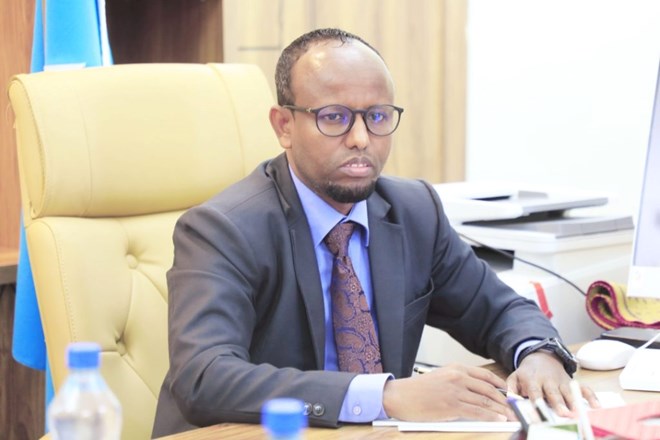
Tuesday July 15, 2025

FILE – Somalia’s Minister of Health, Dr. Ali Haji Adam, speaks during a press briefing at his office
Mogadishu (HOL) — Somalia’s Minister of Health on Tuesday issued a nationwide alert over the rapid spread of hepatitis, calling for urgent action to expand testing, raise awareness, and increase access to vaccines.
Health Minister Dr. Ali Haji Adam said the country is witnessing an “alarming surge” in hepatitis infections, particularly in urban and rural areas with limited health infrastructure. He warned that unless the government and public act quickly, the virus could spread further and overwhelm healthcare services.
“Hepatitis is a silent but deadly threat to public health,” said Dr. Ali. “We must act collectively to prevent its spread by scaling up testing, vaccination, and public awareness.”
Hepatitis refers to a group of viral infections that cause inflammation of the liver. The most common forms—hepatitis A, B, and C—can lead to severe liver damage or death if untreated. While hepatitis A is often transmitted through contaminated food or water, hepatitis B and C spread through contact with infected blood or bodily fluids.
The Ministry of Health has urged all Somali citizens to visit nearby health centers for testing and participate in vaccination campaigns. Those experiencing symptoms such as fatigue, jaundice, abdominal pain, or nausea are encouraged to seek immediate medical advice.
Health officials are urging citizens to avoid misinformation, follow medical guidance, and report suspected cases promptly.
Dr. Ali also called on civil society organizations, healthcare workers, and religious leaders to support the national effort by educating communities about prevention and treatment.
Somalia’s healthcare system continues to face significant challenges, including poor diagnostic capacity, a shortage of trained personnel, and fragile infrastructure, all factors that complicate disease control efforts. The Ministry says it is working with international partners to strengthen disease surveillance and expand mobile health services in high-risk areas.






